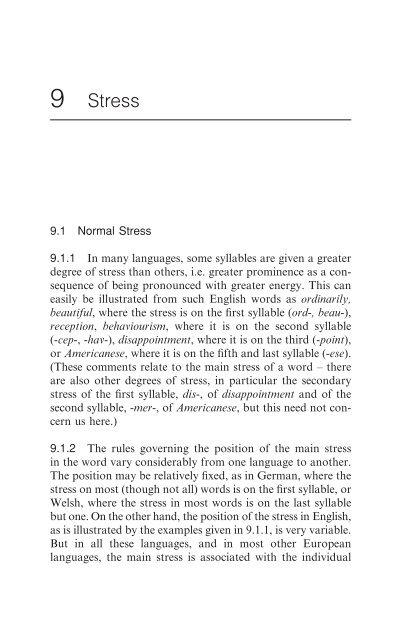An Introduction to French Pronunciation
An Introduction to French Pronunciation
An Introduction to French Pronunciation
Create successful ePaper yourself
Turn your PDF publications into a flip-book with our unique Google optimized e-Paper software.
9<br />
Stress<br />
9.1 Normal Stress<br />
Stress 45<br />
9.1.1 In many languages, some syllables are given a greater<br />
degree of stress than others, i.e. greater prominence as a consequence<br />
of being pronounced with greater energy. This can<br />
easily be illustrated from such English words as ordinarily,<br />
beautiful, where the stress is on the first syllable (ord-, beau-),<br />
reception, behaviourism, where it is on the second syllable<br />
(-cep-, -hav-), disappointment, where it is on the third (-point),<br />
or Americanese, where it is on the fifth and last syllable (-ese).<br />
(These comments relate <strong>to</strong> the main stress of a word – there<br />
are also other degrees of stress, in particular the secondary<br />
stress of the first syllable, dis-, of disappointment and of the<br />
second syllable, -mer-, of Americanese, but this need not concern<br />
us here.)<br />
9.1.2 The rules governing the position of the main stress<br />
in the word vary considerably from one language <strong>to</strong> another.<br />
The position may be relatively fixed, as in German, where the<br />
stress on most (though not all) words is on the first syllable, or<br />
Welsh, where the stress in most words is on the last syllable<br />
but one. On the other hand, the position of the stress in English,<br />
as is illustrated by the examples given in 9.1.1, is very variable.<br />
But in all these languages, and in most other European<br />
languages, the main stress is associated with the individual












